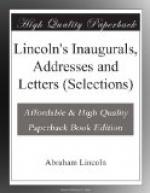Distinction will be his paramount object, and, although he would as willingly, perhaps more so, acquire it by doing good as harm, yet, that opportunity being past, and nothing left to be done in the way of building up, he would set boldly to the task of pulling down.
Here then is a probable case, highly dangerous, and such an one as could have well existed heretofore.
Another reason which once was, but which, to the same extent, is now no more, has done much in maintaining our institutions thus far, I mean the powerful influence which the interesting scenes of the Revolution had upon the passions of the people as distinguished from their judgment. By this influence, the jealousy, envy, and avarice incident to our nature, and so common to a state of peace, prosperity, and conscious strength, were for the time in a great measure smothered and rendered inactive, while the deep-rooted principles of hate, and the powerful motive of revenge, instead of being turned against each other, were directed exclusively against the British nation. And thus, from the force of circumstances, the basest principles of our nature were either made to lie dormant, or to become the active agents in the advancement of the noblest of causes—that of establishing and maintaining civil and religious liberty.
But this state of feeling must fade, is fading, has faded, with the circumstances that produced it.
I do not mean to say that the scenes of the Revolution are now or ever will be entirely forgotten, but that, like everything else, they must fade upon the memory of the world, and grow more and more dim by the lapse of time. In history, we hope, they will be read of, and recounted, so long as the Bible shall be read; but even granting that they will, their influence cannot be what it heretofore has been. Even then they cannot be so universally known nor so vividly felt as they were by the generation just gone to rest. At the close of that struggle, nearly every adult male had been a participator in some of its scenes. The consequence was that of those scenes, in the form of a husband, a father, a son, or a brother, a living history was to be found in every family—a history bearing the indubitable testimonies of its own authenticity, in the limbs mangled, in the scars of wounds received, in the midst of the very scenes related—a




